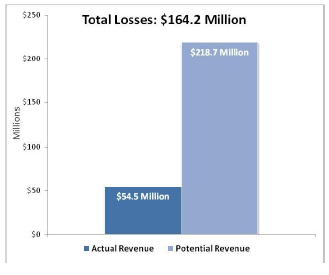Sunken Millions: The Hidden Cost of Overfishing to Commercial Fishermen
In 2009, commercial fishermen in the New England, South Atlantic and Gulf of Mexico regions that targeted depleted ocean fish populations lost $164.2 million and realized just 25 percent of potential revenues because of decades of overfishing–catching fish faster than they can reproduce (for full analysis, see www.pewenvironment.org/costofoverfishing). This additional income could have been earned had these fish populations not been subject to years of overfishing that resulted in their current depleted condition.  Congress recognized this costly legacy of overfishing in 2006 when it strengthened the Magnuson-Stevens Fishery Conservation and Management Act (MSA) with bipartisan requirements to establish science-based catch limits to end overfishing and rebuild depleted fish populations. Congress should stay the course with the MSA so that we can restore our nation's fish populations to healthy levels and put those dollars back in fishermen's wallets.
Congress recognized this costly legacy of overfishing in 2006 when it strengthened the Magnuson-Stevens Fishery Conservation and Management Act (MSA) with bipartisan requirements to establish science-based catch limits to end overfishing and rebuild depleted fish populations. Congress should stay the course with the MSA so that we can restore our nation's fish populations to healthy levels and put those dollars back in fishermen's wallets.
Overfishing results in significant economic losses. In the United States, chronic overfishing has depleted more than 20 percent of the country's most commercially and recreationally valuable ocean fish populations, including some species of cod, flounder, snapper and grouper. The biological consequences of unsustainable fishing have been studied extensively, but the economic impacts are seldom quantified.
The Pew Environment Group commissioned Ecotrust, one of the leading providers of marine social and economic knowledge, to examine this problem. The Hidden Cost of Overfishing to Commercial Fishermen analyzes the impact of chronic overfishing by calculating the revenue lost in 2009 by commercial fishermen in three regions with the highest levels of overfishing.
The current economic debate about fisheries management has too often focused on the cost of regulation, but this report demonstrates that the cost of allowing overfishing to continue can be significantly greater. Congress should reject bills that undermine ongoing efforts to end and prevent overfishing through the use of science-based annual catch limits. Instead, Congress should support the conservation requirements of the MSA that will help provide enduring economic benefits to fishermen.
"Old salts" in New England's commercial cod fishery also know the cost of overfishing. They remember how different the fishing was just a few decades ago and call for science-based management to bring back a healthy fishery. Visit http://www.pewenvironment.org/costofoverfishing to hear their tales in a short video and see pictures as they reminisce about the great Atlantic cod.











